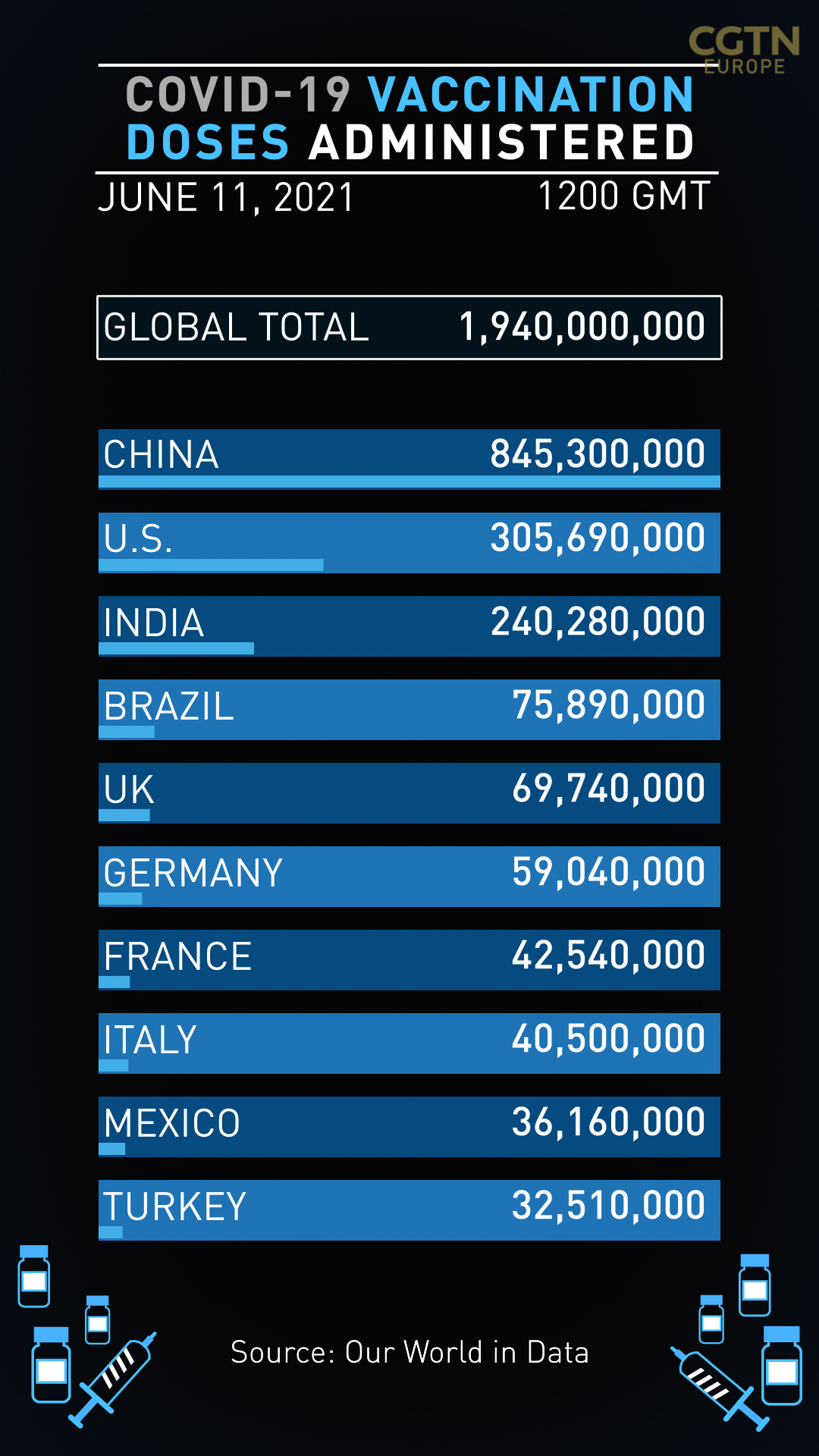• The G7 countries will donate 1 billion jabs to the world's poorest nations. But while the World Health Organization welcomed the pledge, it stressed that the speed of the donation is also crucial.
• The UK's Foreign Secretary Dominic Raab said the country will donate 5 million doses of vaccine in "the coming weeks and months" and 25 million more doses by the end of 2021.
• G7 leaders will discuss a post-pandemic recovery over the weekend, in addition to the distribution of vaccines to countries that cannot afford or access them.
• The pandemic has fueled racism, child abuse and increased inequalities, according to a report by the EU's Agency for Fundamental Rights.
• Foreigners visiting Ukraine will still have to show a negative test result even if they received Russia's Sputnik V vaccine.
• Russia just reported its highest number of cases since February. On Friday, the country said 12,505 people tested positive in 24 hours, a dramatic increase from the 7,000 to 9,500 cases reported in previous weeks.
• The production of CureVac, a vaccine developed in Germany, has been delayed because not enough participants in the trial have caught the virus.
• China administered 20 million doses yesterday, meaning the country has given out 845 million jabs since the roll-out began.
• Bulgaria plans to no longer require people to wear masks in small shops, offices, gyms and hair salon. However, people will still be required to wear masks in large shops or on public transport.
• The EU will not buy 100 million doses of the Johnson & Johnson vaccine, according to European officials. The decision reflects a drop in confidence in the vaccine, which only requires one dose.
• Germany plans to crack down on fraudulent test centers after media reports said some providers were charging for more tests than administered. The government will now implement spot checks and reduce the number of costs it reimburses.

Unlike other vaccines, the Johnson & Johnson jab only requires one dose. /AFP /Frederic J. Brown
Unlike other vaccines, the Johnson & Johnson jab only requires one dose. /AFP /Frederic J. Brown
ACROSS EUROPE
Ross Cullen in Paris
France is continuing to see an improving health picture in terms of the pandemic. The number of average daily cases is now 6,000, down from a third-wave peak of 40,000 in April.
The incidence rate (the number of cases per 100,000 people over seven days) is now below that of the UK.
The number of patients in intensive care has fallen to 2,300, down from 6,000 on April 26.
Meanwhile, France's vaccination drive shows no signs of slowing down. The government looks set to beat its target of 30 million first vaccinations by the middle of this month. And 29.4 million people have so far had one dose, while 13.4m people are fully vaccinated.
Toni Waterman in Brussels
From next Wednesday, people in Flanders under 41 years old can opt to receive the Johnson & Johnson (J&J) vaccine. This is despite a halt on the single-dose jab being administered to younger age groups in Belgium due to blood-clotting concerns.
Given the side effect is rare, the Flemish welfare minister said the under-41s could voluntarily come forward.
It's unclear how many shots will be on offer. Some 2.4 million doses are being blocked from distribution in Belgium as the EU drugs regulator awaits a report from the U.S. Food and Drug Administration on whether the vaccines were produced in a safe and correct way.
Last month, an inspection in the U.S. city of Baltimore discovered components of the J&J vaccine were switched with those of AstraZeneca. Three of those contaminated lots ended up in Europe.
The report is expected by the end of this week.
Penelope Liersch in Budapest
Hungary's Prime Minister Viktor Orban has announced those who refuse their second vaccination, if one is required, will be stripped of their immunity certificates.
Orban said 137,000 people have chosen not to have their second vaccine. In Hungary, the vaccine protection certificate is mailed out following the first dose.
Children in the country are eligible to be vaccinated with the Pfizer jab, following an announcement yesterday that 12 to 15-year-olds can be registered by their parents via the online process. Children aged over 12 have already begun being vaccinated in Romania, Slovakia and Poland. Hungary's 16 to 18-year-olds began receiving their vaccines just over a month ago.
And 68,000 doses of the Moderna shot are expected to arrive in Hungary today. More than 5.3 million people have received their first dose of the vaccine and another 4.1 million have had a second dose.
Rahul Pathak in Madrid
Spain's national soccer team coach says he hopes captain Sergio Busquets and Diego Llorente will still be able to play at Euro 2020, despite both testing positive.
Luis Enrique has suggested defender Llorente's positive test on Tuesday may have been inaccurate after further tests came back negative.
The player will have more tests on Friday. If he clears those, the Spanish football federation says he can return to the squad before Spain's first match in the tournament on Monday against Sweden.
Busquets and Llorente's positive tests prompted the Spanish government to order the entire squad be vaccinated.
Enrique said this should have happened two months ago to allow the players to get over any possible side effects from the Pfizer jab.
00:20

FROM OUR GLOBAL COLLEAGUES
CGTN Europe: Skeletons of viking relatives reunited after 1,000 years
CGTN China: Carbon capture technology: What governments should do
CGTN America: How is laundry contributing to plastic pollution?
CGTN Africa: Reporter's Diary: Meeting a nomadic Berber family in Morocco
Sign up here to get the COVID-19 Europe bulletin sent directly to your inbox.
CGTN Europe has been providing in-depth coverage of the novel coronavirus story as it has unfolded.

